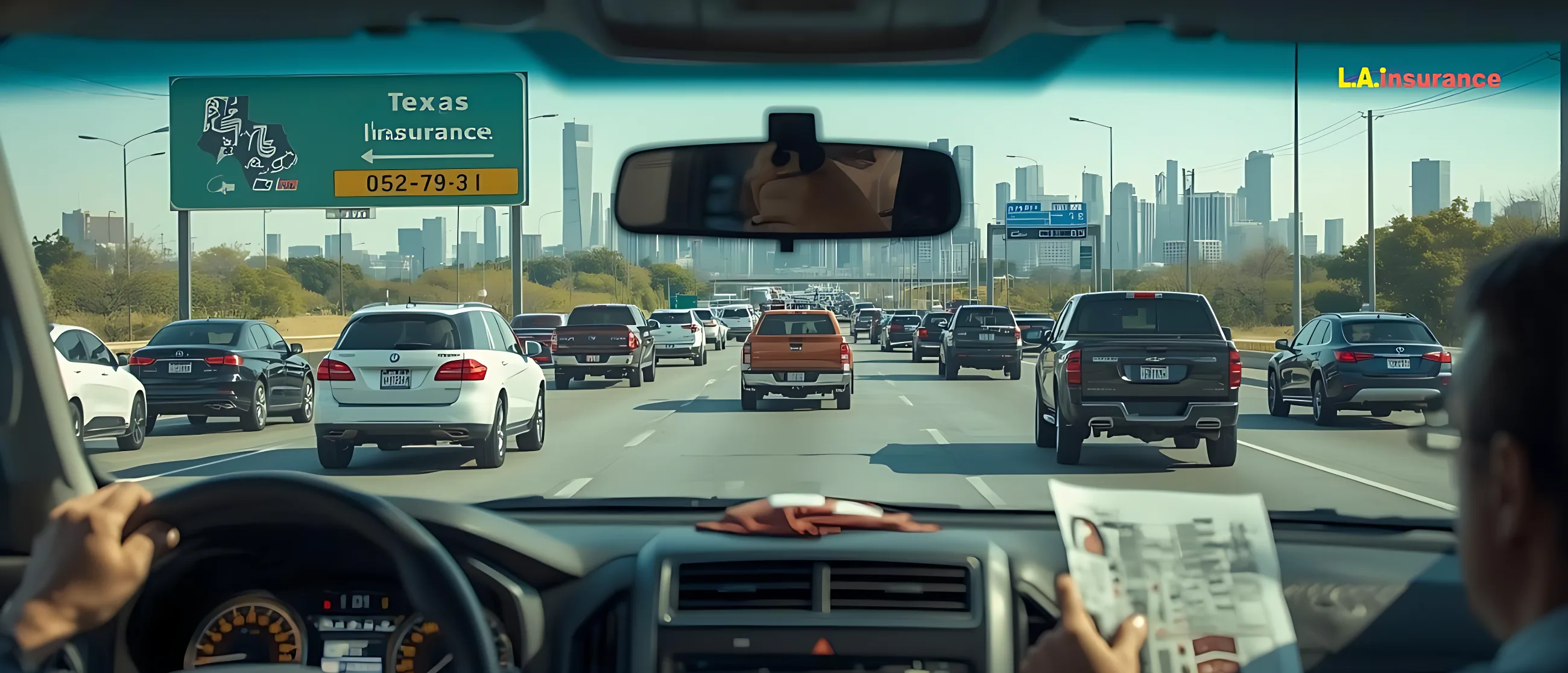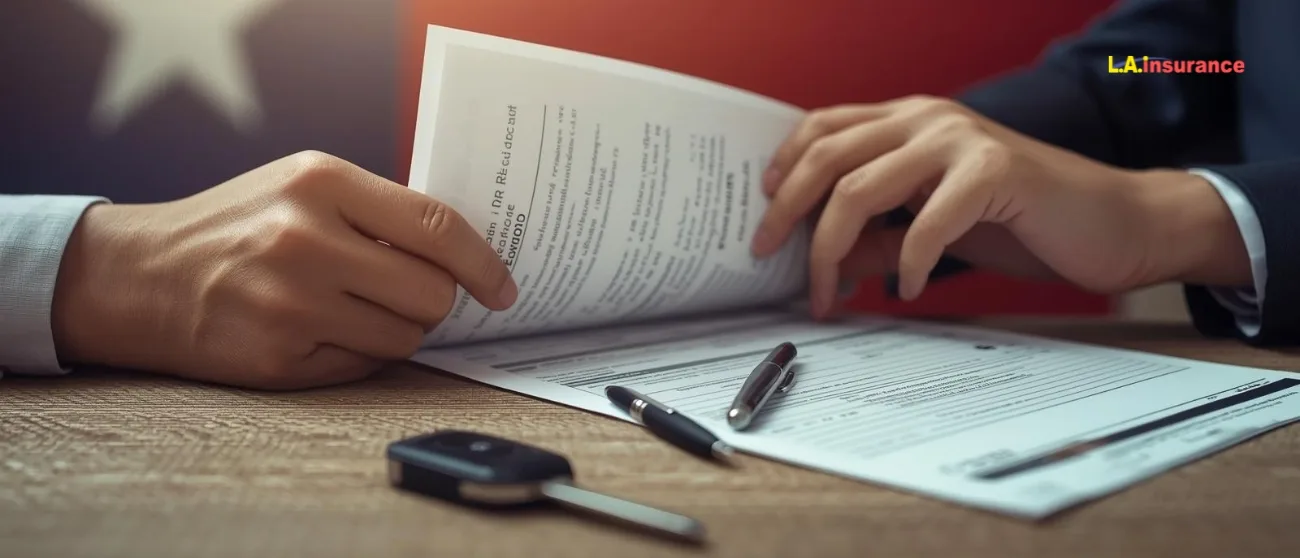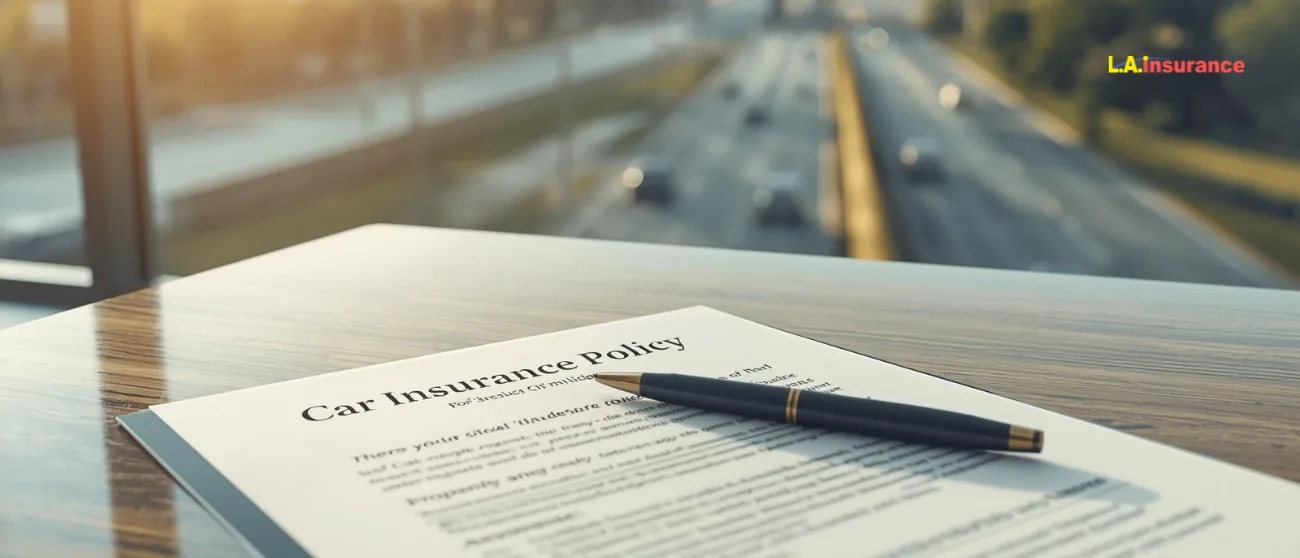
Publish Date: 13-09-2025
Auto Insurance
Last Updated: 17-12-2025
Car Insurance Lapse & Grace Period Explained
Life gets hectic, and insurance isn't always top of mind. But letting your car insurance lapse, even for a short time, can bring serious consequences like increased premiums, fines, license suspension, and no coverage in the event of an accident. To avoid these setbacks, it's important to maintain continuous insurance coverage.
In this article, you'll learn exactly what a car insurance lapse means, what causes it, how grace periods work, what penalties you might face, and the steps to reinstate your coverage safely.
What Does Car Insurance Lapse Mean?
A car insurance lapse occurs when there is a gap in your auto insurance coverage, whether it lasts a day or several months. During this time, you are considered uninsured, which means you're not only unprotected financially but also violating state laws. Even if you’re not driving, having a registered vehicle without insurance is still viewed as a lapse and can lead to serious consequences.
That short window without insurance can raise red flags with insurance companies, flagging you as a higher risk. And that label comes with higher premiums, trouble getting approved by certain insurance providers, as well as legal trouble if you’re caught driving during the lapse.
What Causes a Car Insurance Lapse?
Insurance lapses aren’t always intentional. Sometimes, they happen because life got in the way. Other times, maybe it’s a technical or financial issue. So, here are the most common causes:
- Missed payment: You simply forgot or couldn’t afford your premium. Even being late by one day can lead to cancellation if you’re outside the grace period.
- Expired Policy: Your auto policy ended, and you forgot to renew it on time.
- Mailing issues: You moved and didn’t update your billing address.
- Policy Cancelation: Your insurance provider canceled the policy due to too many claims, driving under the influence, or risky driving behavior.
- Switching Companies: You switched car insurance companies and didn’t sync your old and new policy dates, which leaves a gap in insurance coverage.
5 Things You Can Do If Your Car Insurance Lapses
If your car insurance lapses, don’t panic. However, don’t delay either. If you take quick action, it can reduce penalties, prevent further issues, and probably save your license.
Here’s what to do:
1. Stop Driving Immediately
If you realize your car insurance lapses and you’re driving uninsured, the first thing you should do is to stop driving. Even if you do drive uninsured for one day and get pulled over, you risk fines, license suspension, or worse if you get into a car accident. So, park your vehicle until you’re covered again.
2. Contact Your Insurance Company
Call your insurance company to ask if you’re still within a grace period. If yes, you may be able to pay the late fee and reinstate your coverage without a lapse showing on your record.
3. Ask About Reinstatement
Even if you’re past the grace window, some car insurance companies allow you to reinstate your auto insurance policy by signing a “no loss” statement and paying any missed premiums and reinstatement fees. In some cases, they may let you keep your original coverage date if you're just a few days late. Also, check if your state requires you to file an SR-22 form, a special document that proves you're carrying insurance after a lapse or violation.
4. Compare Car Insurance Quotes
If your insurer won’t reinstate you, shop around. Look for auto insurance with a lapse in coverage or the cheapest car insurance after lapse. Some companies consider insuring drivers with insurance history gaps. You can contact L.A. Insurance, the most reliable and affordable insurance agency, if you have missed payments or your coverage has lapsed.
5. Set Up Autopay or Reminders
If you want to avoid a lapse in coverage, you can use automatic payment or mark due dates in your phone. Some providers even offer a discount for setting up autopay with your credit card or bank.
What Is a Car Insurance Lapse Grace Period?
A car insurance lapse grace period is the short time your insurance provider gives you to make a late payment before your auto insurance policy is canceled. During this window, your coverage might still be considered active even though you’ve missed your due date.
In simple terms, think of it as your insurance company holding the door open for just a little longer. If you walk through and make your payment on time, your auto insurance coverage continues as if nothing happened. If not, the door shuts, your policy lapses, and you’re suddenly uninsured.
For example, if your car insurance premium was due on the 1st and you pay it on the 5th, you may still be covered, but only if you’re within the grace period outlined by your insurer.
How Long of a Grace Period Do I Have to Pay My Car Insurance?
Car insurance lapse grace periods vary based on your insurance company policy, and sometimes your state law. Here’s a general breakdown:
- Most auto insurance companies offer a grace period ranging from 7 to 30 days.
- Some may offer as few as 3 days, while others allow up to two weeks or more.
- If you’re enrolled in automatic payments, grace periods may be tighter or non-existent.
The best way to know about your grace period is to call your insurance provider and ask them directly. You can also read your policy documents to confirm whether you have a grace period or not. You can find the grace period information in the “Cancellation” or “Non-Payment” sections.
State-Specific Rules About Grace Periods
Some states add legal protections or mandates around grace periods, while others leave it up to insurers. Let’s look at a few notable examples:
- Michigan: Michigan law requires insurance companies to send written notice at least 10 days before canceling a monthly policy for nonpayment. 7 days are allowed for weekly policies and 31 days for other policies, as per MCL - Section 500.3410 of the Insurance Code. While it doesn’t require a grace period, this notice effectively gives you time to act.
- North Carolina: Unlike some states, North Carolina does not mandate a grace period. If your premium is overdue and you don’t pay in time, your policy can be canceled immediately after notice.
- Colorado: For a new car, you may get a grace period of 7 to 30 days from most insurance providers.
So, while “grace period” sounds like a friendly cushion, its availability and length depend a lot on where you live and who you’re insured with. Besides, the “no pay no play” states like Alaska, California, Michigan, Indiana, Iowa, and so on may limit the ability of uninsured drivers to recover non-economic damages.
Insurance Carrier Grace Period Policies (Comparison)
Here's how different insurance companies handle grace periods:
Insurance Company | Grace Period | Reinstatement Option |
L.A. Insurance | Up to 30 days | Yes, if no accident occurred during the lapse |
Progressive | 10 to 20 days | Yes, if no accident occurred during the lapse |
GEICO | Up to 9 days | Yes, it may require payment in full |
State Farm | Typically, 10 days | Case by case, it often allows reinstatement |
Allstate | Varies by state | Yes, but often includes a late fee |
Direct Auto | Up to 30 days | Reinstatement available with conditions |
Always verify with your specific insurance provider and local regulations. Terms can change based on your policy type, payment method, and location.
What Happens If I Let My Auto Insurance Lapse?
Letting your auto insurance coverage lapse, even if it’s for a single day, it can trigger a chain of problems. First, if you’re driving during the lapse, you’re breaking the law in most states. You’re also completely unprotected in the event of a car accident, which means you could be responsible for all personal injury and property damage out of pocket. So, you won’t enjoy any legal or financial safety net.
Second, your insurance provider may label you as high-risk. Even if you avoid an accident, a lapse in coverage often leads to higher insurance premiums when you try to get insured again. Some companies may even refuse to offer you a policy.
Third, your insurance history will show a gap. That can stay on your record up to three years and sometimes even longer, depending on the state and the insurer.
And finally, you might lose eligibility for things like roadside assistance, claim-free discounts, or umbrella insurance bundles. Even a short lapse affects your entire insurance profile.
Besides, in some states, such as New York, your insurer must notify the DMV within 7 days of a lapse. This can lead to possible registration suspension or SR-22 requirements.
More>> Can You Get Auto Insurance with a Suspended License?
What If It’s Just One Day?
One day seems harmless, but it can be enough to:
- Invalidate your coverage retroactively
- Disqualify you from “continuous coverage” discounts
- Interrupt your SR-22 status if required
- Make you personally liable in an accident
However, some insurance companies will allow you to reinstate within a day if no incident occurred. But that’s not guaranteed.
What to Do If You Have an Insurance Lapse on a Financed Vehicle?
If a vehicle is financed or leased, a car insurance lapse can lead to even harsher consequences. Most lenders require full coverage auto insurance, including collision and comprehensive coverage.
And if you fail to maintain continuous coverage on your financed vehicle, your lender may impose force-placed insurance at a much higher cost or demand proof of reinstatement via SR-22 filing, depending on your state.
Here's what you may face in this situation:
- The lender may add force-placed insurance (also called collateral protection)
- You could violate your loan or lease agreement, which risks repossession of the vehicle.
- Your credit score might take a hit if unpaid lender premiums are reported.
Unfortunately, if you have had a lapse on a financed car, act fast:
- Call your insurance company and see if reinstatement is possible.
- Contact your lender to update them and avoid additional charges.
- Get new coverage immediately if reinstatement is denied.
How Long Does a Lapse in Car Insurance Stay on Your Record?
A car insurance lapse doesn’t vanish the moment you get a new policy. Most insurance companies will see that gap in your insurance history for anywhere from six months to three years, depending on the length of the lapse and your state laws.
The longer you go uninsured, the more it hurts. A short gap of a few days may cause a small bump in your insurance premiums. But a 30-day lapse can increase your rates by up to 35%, according to data from Quadrant Information Services. Some drivers have reported rate hikes between 8% and 35%, depending on the state and insurance provider.
Insurers see a lapse in coverage as a sign of financial risk or irresponsibility. Even if you didn’t have a car accident during that time, your next auto insurance policy may come with stricter terms or higher costs.
And if that lapse led to license suspension, an SR-22 requirement, or driving without insurance, it could stick on your motor vehicle record even longer, up to five years in some states.
If you’re lucky, some insurance providers may forgive very short lapses if you’re a long-time customer with no claims. But many won’t. That’s why keeping continuous coverage matters.
What Happens If Your Auto Insurance Lapses in Michigan?
In Michigan, the consequences of a car insurance lapse are quite serious. The state follows a no-fault insurance system, which means if you’re uninsured, even for a single day, you lose the right to certain protection, even if the accident wasn’t your fault.
Here’s what can happen if your auto insurance policy lapses in Michigan:
- You lose benefits under no-fault law. If you’re in a car accident during a lapse, you won’t be eligible for personal injury protection (PIP) benefits, which cover medical bills, lost wages, and more. That means you’ll have to pay out of pocket.
- You can’t sue for damage or get sued. Michigan law bars uninsured drivers from suing others for pain and suffering, even if the other driver was at fault. But here’s the catch: you can still be sued for injuries or property damage you cause. You’ll have no liability car insurance to protect you.
- Your registration can be suspended. Under Michigan law, driving without insurance coverage is illegal. If caught, your license and vehicle registration may be suspended, and you could face fines or even jail time.
- The UD-10 traffic crash report will expose your lapse. In Michigan, when police respond to a crash, they will fill out a UD-10 Traffic Crash Report, a formal record of the incident. One section of that report specifically asks if the driver had valid auto insurance coverage at the time of the accident. If your coverage lapsed, that detail will be clearly marked on the report and can be used against you in court or by insurance companies later.
You’ll likely pay more for future coverage. Michigan insurers may consider a lapse in coverage a sign of high risk. When you try to reinstate or buy a new auto insurance policy, your insurance premiums could increase sharply
How to Reinstate Car Insurance After a Lapse or Cancellation
If your car insurance has lapsed or been canceled, the most important thing is to act fast. The longer you wait, the harder and more expensive it gets to get covered again. Here’s how to get back on the road safely and legally.
1. Call Your Insurance Provider Right Away
If the lapse just happened, and you haven’t had a car accident or violation during that time, your insurance company might allow a reinstatement. You may need to pay the missed premium, a late fee, and sign a “no loss” statement confirming you didn’t file a claim during the gap.
2. Ask About Grace Periods
Some insurers offer a short grace period, usually 7 to 10 days, before canceling your auto policy. If you’re still within that window, you might not have a lapse in coverage on your record at all.
3. Shop for a New Policy If Needed
If your old insurer won’t reinstate you, it’s time to compare quotes. Look for companies that offer auto insurance with a lapse in coverage. Some specialize in helping high-risk drivers get back on track.
If you’re in Michigan, Colorado, Florida, Nevada, Arizona, or Texas and looking to reinstate your auto policy, reach out to L.A. Insurance. We are one of the largest independent insurance agencies in North America and specialize in offering full coverage auto insurance to high-risk drivers, even with a DUI or SR-22 form. Get your auto insurance quote now.
Pro Tip: Be honest about your insurance lapse when applying. Most insurance providers can see your coverage history, and hiding a lapse could lead to denial later.
4. Prepare for a Possible SR-22
In some states, especially if your license was suspended due to the lapse, you may need to file an SR-22. It’s a form proving you have active liability car insurance. This usually comes with higher insurance premiums and fees.
5. Set up Autopay or Billing Reminders
To avoid this happening again, enroll in automatic payments or calendar alerts. Many car insurance companies also offer discounts for autopay setups using your credit card or bank account.
Car Insurance Lapse Penalties After Grace Period
Once your grace period ends, and your car insurance premium still hasn’t been paid, your auto insurance policy is officially canceled. From that moment on, you’re no longer covered and the penalties start stacking up quickly.
Here’s what can happen after the grace period expires:
You’re Driving Uninsured
This is the biggest risk. If you're pulled over or involved in a car accident, you’ll have no auto insurance coverage to protect you. In most states, that’s a serious offense and comes with fines, possible license suspension, and even vehicle impoundment.
You May Face Reinstatement Fees
If your insurance provider allows you to restore your policy, they’ll likely charge a late fee or reinstatement fee. Some may also require a down payment to reactivate coverage, especially if your lapse lasted more than a few days.
Your Premiums Will Go Up
Once you’ve had a lapse in coverage, you’re no longer considered a “preferred risk” by many car insurance companies. When you apply for a new policy or reinstate your old one, expect your insurance premiums to increase. According to industry data, a lapse as short as 30 days can cause rates to rise by 8% to 35%, depending on your insurance history and state.
You may be required to file an SR-22
In some states, especially if your lapse leads to a license suspension, you’ll need to file an SR-22, which is a certificate of financial responsibility. This makes it harder and more expensive to get insured, and it stays on your record for several years.
You’ll Lose Access to Discounts and Extras
A lapse breaks your continuous coverage record, which disqualifies you from many loyalty or safe-driver discounts. You may also lose access to extras like roadside assistance, bundled home insurance savings, or lower deductibles over time.
More>> What Happens If You Don’t Have Car Insurance?
How to Avoid Car Insurance Lapse in the First Place
Keeping your car insurance active is easier than trying to fix a lapse. Here’s how to stay covered without any interruptions:
- Set reminders for payment due dates, renewals, and policy expirations.
- Use autopay through your bank or credit card to avoid late or missed payments.
- Update contact info with your insurance company, especially if you move.
- Review your budget and choose a premium you can afford long term
- Plan ahead if switching car insurance providers. Avoid gaps between policy start and end dates.
- Talk to your insurer if you're struggling. Some offer flexible payment options or temporary adjustments.
Car Insurance Lapse and Grace Period FAQs
What’s the difference between a car insurance pause and a lapse?
A pause is temporary, often for a few days, while a lapse means your coverage is fully inactive.
What happens if I can’t pay my car insurance this month?
Contact your insurance provider immediately. They may offer an extension, grace period, or alternative payment options to prevent a lapse.
What if my car insurance lapsed and I had an accident?
You’ll be personally liable for damages. Without insurance coverage, you risk paying for property damage, medical bills, and legal fees.
How much does a car insurance rate increase after a lapse in coverage?
Rates can increase 8% to 35% depending on how long the lapse was and your insurance history.
How long are you covered after your car insurance expires?
You’re no longer covered once your insurance policy expires, unless a grace period applies.
Is there a 30-day grace period for car insurance?
Some insurers offer a grace period of up to 30 days, but it depends on your provider and policy terms.
How to handle a car crash after a coverage lapse?
If you’re in an accident without coverage, you’ll need to cover costs out of pocket. Seek legal advice if necessary.
What is the cheapest car insurance for drivers with a coverage lapse?
High-risk insurers may offer coverage, but expect higher premiums. Compare quotes from specialist insurers to find the best deal.
Can I get insurance after a lapse in coverage?
Yes, you can get insurance after a lapse, but premiums may be higher, and you may need to show proof of prior coverage.
Does a lapse in car insurance coverage affect rates?
Yes, a lapse can cause your auto insurance premiums to rise, as insurers see you as a higher risk.
Editorial Disclaimer
The information provided on this blog is for general informational purposes only and does not constitute professional insurance, legal, or financial advice. Coverage and rates are subject to individual eligibility, underwriting guidelines, and state availability. For specific questions regarding your policy or to get an accurate quote, please contact a licensed L.A. Insurance agent directly. We're an independent agency and not a direct insurance carrier. For more information on how we operate and handle your data, please see our Terms and Conditions and Privacy Policy.
Tag :
Auto insurance
Comercial Auto








